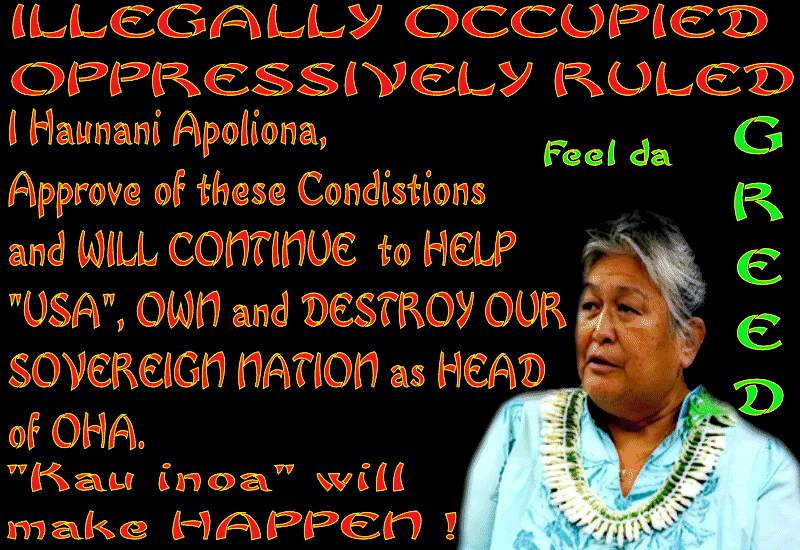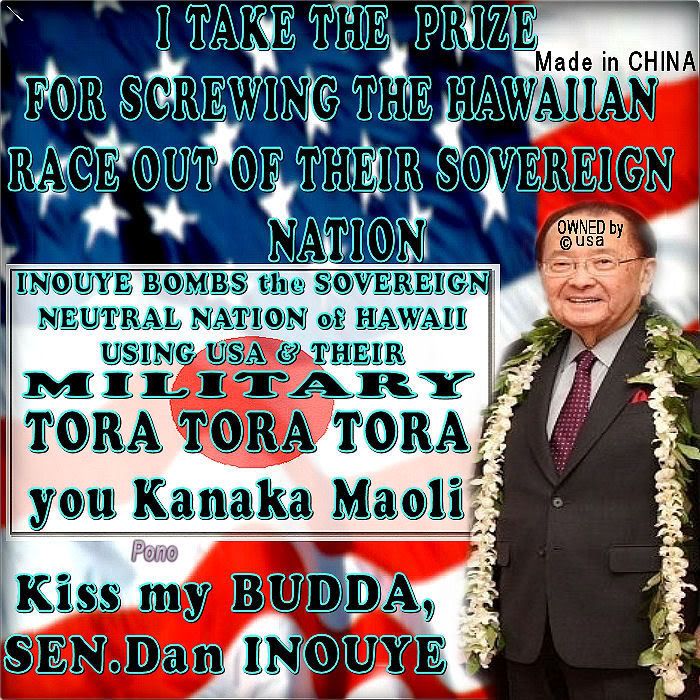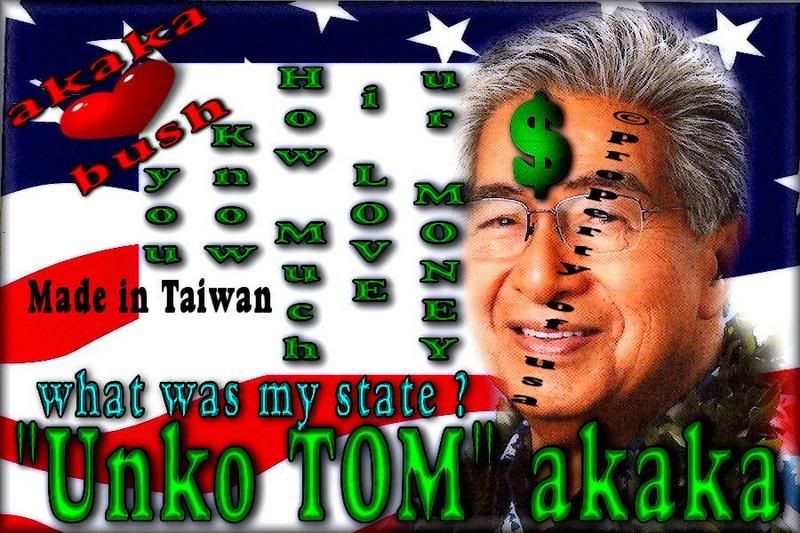All Posts (6434)



 Akaka Bill backers like the new oddsThe U.S. Senate's 58 Democrats should lift the measure's chancesBy B.J. Reyeshttp://www.starbulletin.com/news/20081222_akaka_bill_backers_like_the_new_odds.htmlPOSTED: 01:30 a.m. HST, Dec 22, 2008The arrival of a new Democratic administration in Washington, coupled with Democratic control of Congress, has given renewed hope to supporters of federal recognition for native Hawaiians."The results of the presidential and congressional elections open a window of opportunity for native Hawaiian initiatives and Hawaii initiatives," Office of Hawaiian Affairs Chairwoman Haunani Apoliona said in her recent State of OHA speech. "Based on previous expressed support for the Akaka Bill by President-elect (Barack) Obama, a smoother and timely passage and enactment of the Native Hawaiian Government Reorganization Act is anticipated."During his campaign, Obama said he would support native Hawaiian recognition if a bill were to reach his desk.The legislation would allow for the formation of a governing body for native Hawaiians, similar to that of American Indians, that would negotiate with state and federal governments over land and other resources.Opponents say the measure is racially discriminatory and divisive. Native Hawaiian sovereignty groups also oppose the legislation, saying it does not go far enough to grant Hawaii independence from the U.S. government.To date, no version of the Akaka Bill -- named after its primary sponsor, U.S. Sen. Dan Akaka (D, Hawaii) -- has made it out of Congress.Although the U.S. House this year approved a version of the bill, it stalled in the Senate, where Republicans have stalled the measure time and again. Additionally, President Bush has opposed the legislation.Two years ago, Akaka attempted to bring the bill to the Senate floor for an up-or-down vote by the full chamber. The motion fell four votes shy of the 60 needed to force a vote.But Nov. 4 brought change to Capitol Hill. In addition to Obama's victory, Democrats also will control at least 58 of the 100 seats when the next Congress opens."I am looking forward to working with President-elect Obama and meeting with my newly elected Senate colleagues to discuss my bill and the many other important matters that will come before the upcoming Congress," Akaka said in a statement provided by his office. "The U.S. has formally recognized American Indians and Alaska natives and should provide parity for Hawaii's indigenous people."Jon Van Dyke, a constitutional law professor at the University of Hawaii who supports the Akaka Bill, said "the stars seem to be aligned" in the bill's favor. "With the increase in Democrats in the Senate, plus some of the key Republicans that have always supported it ... still there, it seems like the votes should be there to pass it," he said.Because of the new Congress, the legislation would have to be reintroduced and go through the formal hearing process again in both chambers. Akaka said he plans to introduce a bill .At least one opponent said he does not expect the Akaka Bill to be a priority for lawmakers when they convene the next Congress. Given the country's financial troubles and the focus likely to be paid to an economic stimulus plan, any discussion of the Akaka Bill would be best left for several months down the road, said Richard Rowland, president of the Grassroot Institute of Hawaii."I don't think that Mr. Obama and his administration want to use any of their capital on this," Rowland said. "Why should they? From their standpoint it looks like they've got it as a slam dunk."So why wouldn't they wait till next September or October, or even 2010?"In the meantime, the institute, which opposes racially based preferences, will continue to inform the public about the bill, he said."My feeling is that with some more education -- education on what the implications are -- that rational people can all look at it and say, 'This is just not very healthy,'" Rowland said.................................................................................................................Keep the Door Open!!We support those who support protecting the ‘entitlements’ programs, but Keep the Door Open!But foreclosing the options available to us by our right of self-determination – specifically, our native right to be an independent nation, we cannot support!We have the doctrine of consent in our favor - in addition to our prior recognition as an independent government.We have never consented to a political accommodation with the United States.If we consent by agreeing to go along with this bill that limits our right to self-determination to the confines of domestic federal law - we will have given consent, and we will no longer be able to argue that point.Right now we can argue that our right is being violated under several conventions, such as the one on civil and political rights.If we go along with the bill as is, we will not be able to do that. We will become a dependent population within the nation state. We will be more than the "ethnic group" they are trying to categorize us as now, but we will not be a "peoples" within the general international norms.And finally, if we become a dependent nation within a nation, we will not be able to utilize the principle of intervention – that is, other countries will not interfere with the internal squabbles we have with the nation of the U.S.A.(This has been the case with the Lakota and the Navajo.)Bottom line…MEANINGFUL RECONCILIATIONWe want to save the entitlement programs, but his can be done as part of the Reconciliation process.We should not have to go so far as to give up our right to be independent, to restore our status.Real reconciliation vs. the Akaka billThe nation of Hawai'i was:* Recognized as an independent sovereign state.* Recognized as a member of the world family of nations.* Recognized as an equal party to more than 25 treaties, including treaties with the United States.* Recognized as an independent nation with over 90 consulates worldwide.Apologies can be very powerful, and within the Native Hawaiian culture they are treated with great respect and promise. It has been a decade (15 years) since the United Church of Christ and the United States apologized to the Native Hawaiian people for complicity in the overthrow of the nation of Hawai'i.The potential for genuine reconciliation between Native Hawaiians and the United States exists. The importance of Native Hawaiians achieving economic independence cannot be underestimated as an essential aspect of reconciliation.Reconciliation is a process. The process that we have been using in thinking about reconciliation involves at least four levels or stages: recognition, responsibility, reconstruction and reparationILLUSION OF REALITYWe are not mere "artifacts." The United States and the state of Hawai'i relegate our inherent rights to the past, constrain our development and allow only those activities that support their own necessary illusion: that we, na 'oiwi o Hawai'i today, do not present a challenge to their legitimacy.State sovereignty in Hawai'i is built on illusions. To claim that the state's legitimacy is based on the rule of law is hypocritical and contradicted by history. The laws and the legal system of the United States purport to create "domestic dependent nations," but even that is truly only an illusion.We must reject assumptions that legitimatize our subjugation, and be allowed to evolve. These are necessary steps to achieving self-determination and building a sound native-governed community.As George Jarrett Helm determined, we are in a "revolution of consciousness ... What we (are) looking for is the truth." The facts do matter! In our case, the facts are being misused to support the illusion of reality.What do we hope to protect? What have the co-opted ones forsaken? The answer is, the heart and soul of our nation, our queen, and our kupuna (elders) and aloha I ke kahi I ke kahi, a respectful and peaceful co-existence.by:KuleanaWaipahu, HI
Akaka Bill backers like the new oddsThe U.S. Senate's 58 Democrats should lift the measure's chancesBy B.J. Reyeshttp://www.starbulletin.com/news/20081222_akaka_bill_backers_like_the_new_odds.htmlPOSTED: 01:30 a.m. HST, Dec 22, 2008The arrival of a new Democratic administration in Washington, coupled with Democratic control of Congress, has given renewed hope to supporters of federal recognition for native Hawaiians."The results of the presidential and congressional elections open a window of opportunity for native Hawaiian initiatives and Hawaii initiatives," Office of Hawaiian Affairs Chairwoman Haunani Apoliona said in her recent State of OHA speech. "Based on previous expressed support for the Akaka Bill by President-elect (Barack) Obama, a smoother and timely passage and enactment of the Native Hawaiian Government Reorganization Act is anticipated."During his campaign, Obama said he would support native Hawaiian recognition if a bill were to reach his desk.The legislation would allow for the formation of a governing body for native Hawaiians, similar to that of American Indians, that would negotiate with state and federal governments over land and other resources.Opponents say the measure is racially discriminatory and divisive. Native Hawaiian sovereignty groups also oppose the legislation, saying it does not go far enough to grant Hawaii independence from the U.S. government.To date, no version of the Akaka Bill -- named after its primary sponsor, U.S. Sen. Dan Akaka (D, Hawaii) -- has made it out of Congress.Although the U.S. House this year approved a version of the bill, it stalled in the Senate, where Republicans have stalled the measure time and again. Additionally, President Bush has opposed the legislation.Two years ago, Akaka attempted to bring the bill to the Senate floor for an up-or-down vote by the full chamber. The motion fell four votes shy of the 60 needed to force a vote.But Nov. 4 brought change to Capitol Hill. In addition to Obama's victory, Democrats also will control at least 58 of the 100 seats when the next Congress opens."I am looking forward to working with President-elect Obama and meeting with my newly elected Senate colleagues to discuss my bill and the many other important matters that will come before the upcoming Congress," Akaka said in a statement provided by his office. "The U.S. has formally recognized American Indians and Alaska natives and should provide parity for Hawaii's indigenous people."Jon Van Dyke, a constitutional law professor at the University of Hawaii who supports the Akaka Bill, said "the stars seem to be aligned" in the bill's favor. "With the increase in Democrats in the Senate, plus some of the key Republicans that have always supported it ... still there, it seems like the votes should be there to pass it," he said.Because of the new Congress, the legislation would have to be reintroduced and go through the formal hearing process again in both chambers. Akaka said he plans to introduce a bill .At least one opponent said he does not expect the Akaka Bill to be a priority for lawmakers when they convene the next Congress. Given the country's financial troubles and the focus likely to be paid to an economic stimulus plan, any discussion of the Akaka Bill would be best left for several months down the road, said Richard Rowland, president of the Grassroot Institute of Hawaii."I don't think that Mr. Obama and his administration want to use any of their capital on this," Rowland said. "Why should they? From their standpoint it looks like they've got it as a slam dunk."So why wouldn't they wait till next September or October, or even 2010?"In the meantime, the institute, which opposes racially based preferences, will continue to inform the public about the bill, he said."My feeling is that with some more education -- education on what the implications are -- that rational people can all look at it and say, 'This is just not very healthy,'" Rowland said.................................................................................................................Keep the Door Open!!We support those who support protecting the ‘entitlements’ programs, but Keep the Door Open!But foreclosing the options available to us by our right of self-determination – specifically, our native right to be an independent nation, we cannot support!We have the doctrine of consent in our favor - in addition to our prior recognition as an independent government.We have never consented to a political accommodation with the United States.If we consent by agreeing to go along with this bill that limits our right to self-determination to the confines of domestic federal law - we will have given consent, and we will no longer be able to argue that point.Right now we can argue that our right is being violated under several conventions, such as the one on civil and political rights.If we go along with the bill as is, we will not be able to do that. We will become a dependent population within the nation state. We will be more than the "ethnic group" they are trying to categorize us as now, but we will not be a "peoples" within the general international norms.And finally, if we become a dependent nation within a nation, we will not be able to utilize the principle of intervention – that is, other countries will not interfere with the internal squabbles we have with the nation of the U.S.A.(This has been the case with the Lakota and the Navajo.)Bottom line…MEANINGFUL RECONCILIATIONWe want to save the entitlement programs, but his can be done as part of the Reconciliation process.We should not have to go so far as to give up our right to be independent, to restore our status.Real reconciliation vs. the Akaka billThe nation of Hawai'i was:* Recognized as an independent sovereign state.* Recognized as a member of the world family of nations.* Recognized as an equal party to more than 25 treaties, including treaties with the United States.* Recognized as an independent nation with over 90 consulates worldwide.Apologies can be very powerful, and within the Native Hawaiian culture they are treated with great respect and promise. It has been a decade (15 years) since the United Church of Christ and the United States apologized to the Native Hawaiian people for complicity in the overthrow of the nation of Hawai'i.The potential for genuine reconciliation between Native Hawaiians and the United States exists. The importance of Native Hawaiians achieving economic independence cannot be underestimated as an essential aspect of reconciliation.Reconciliation is a process. The process that we have been using in thinking about reconciliation involves at least four levels or stages: recognition, responsibility, reconstruction and reparationILLUSION OF REALITYWe are not mere "artifacts." The United States and the state of Hawai'i relegate our inherent rights to the past, constrain our development and allow only those activities that support their own necessary illusion: that we, na 'oiwi o Hawai'i today, do not present a challenge to their legitimacy.State sovereignty in Hawai'i is built on illusions. To claim that the state's legitimacy is based on the rule of law is hypocritical and contradicted by history. The laws and the legal system of the United States purport to create "domestic dependent nations," but even that is truly only an illusion.We must reject assumptions that legitimatize our subjugation, and be allowed to evolve. These are necessary steps to achieving self-determination and building a sound native-governed community.As George Jarrett Helm determined, we are in a "revolution of consciousness ... What we (are) looking for is the truth." The facts do matter! In our case, the facts are being misused to support the illusion of reality.What do we hope to protect? What have the co-opted ones forsaken? The answer is, the heart and soul of our nation, our queen, and our kupuna (elders) and aloha I ke kahi I ke kahi, a respectful and peaceful co-existence.by:KuleanaWaipahu, HI


 Get Your Own UnKau Inoa T-ShirtHere's How - UnKauInoa.Org Do It Today!
Get Your Own UnKau Inoa T-ShirtHere's How - UnKauInoa.Org Do It Today!
January 16, 2003
Hawai'i, January 16, 1893
The Rosy Dawn of US Imperialism
by GARY LEUPP
On this day 110 years ago, U.S. Marines, acting at the invitation of wealthy haole (white) sugar planters, invaded the Kingdom of Hawai'i and overthrew Queen Lili'uokalani, eighth monarch in the line of King Kamehameha I. A day, to coin a phrase, that lives in infamy. Five years later, Hawai'i was formally annexed by the U.S.; it became a U.S. "territory" in 1900, and the fiftieth state in 1959.
The inception of U.S. imperialism is generally traced to 1898, and the acquisition of an overseas empire (Puerto Rico, the Philippines) as spoils of the Spanish-American War. From that point, there was a vigorous debate in the U.S. about the pros and cons of imperialism (usually conceptualized as a policy that the government might or might not pursue, rather than as a system constituting, in Lenin's phrase, the "highest stage of capitalism"). Globally, the "new imperialism" is usually dated to the 1870s and 1880s. It's distinguished from the empire-building in the Americas and parts of Asia during the sixteenth to eighteenth centuries by the fact that it was based on direct investment feeding capitalist-industrial economies (rather than the quest for gold, silver, slaves, etc.) From the 1870s, the "scramble for Africa" partitioned nearly the whole of that continent among the European powers. In Polynesia (a region generally neglected by historians, even "world historians"), Fiji, Tahiti, Hawai'i, Samoa, and Tonga were all colonized between 1870 and 1900. The last major Maori uprising in Aotearoa (New Zealand, the southwest limit of Polynesia) was suppressed by the British in 1870.
It seems to me, though, that one can trace the rosy dawn of U.S. imperialism at the very least to 1893 and the Marines' criminal action in Hawai'i, or maybe to the gunboat diplomacy of Commodore Perry's mission to Japan in 1853-4, or maybe even to the actions of American nationals in Hawai'i from the arrival of Protestant missionaries from Massachusetts in 1820. In both Hawai'i and Japan, the U.S. sought to impose what today is lauded in mainstream political and journalistic discourse as "globalization." Encouragement or creation of "free" market economies welcoming exports and foreign investment. Privatization, allowing for foreign acquisition of local resources. "Free flow" of (Judeo-Christian, Greco-Roman, western) ideas. Hospitality to foreign military presence---to insure "freedom" for the right sort of people. This was the agenda of western imperialists throughout Polynesia.
The Hawaiian monarchs, one must grant, abetted the process. In 1821 Kamehameha II, fearing he would burn in hell otherwise, embraced the missionaries' fundamentalist teachings and bowed to their advice. Thereafter missionary families (usually holding both U.S. and Hawaiian citizenship, the latter graciously and foolishly conferred) came to dominate both the Hawaiian economy and its politics. (As they say in Hawai'i, in the beginning the missionaries had the Bible, and the people had the land; now the people have the Bible, and the missionaries, the land.) Submitting to missionary and sugar planter pressure, Kamehameha III agreed to discard the prior system of feudal land tenure (which insured that the maka'aina or commoners could engage in subsistence agriculture-very productive and healthy agriculture at that) with a system of private property that in short order dispossessed the great majority of Hawaiians, whose ranks were being horrifically decimated by diseases introduced from abroad. He allowed resident foreigners to vote in elections for the newly formed legislature, on a par with native Hawaiians. Fearing the mounting influence of Americans, he even began negotiating with them about the annexation of his nation on terms that would at least allow for Hawaiians' survival.
This king was succeeded by two rulers, both his nephews, who terminated discussion of annexation, sought to diminish Americans' influence over the polity, and strove to build ties with Japan (recently "opened," and an up-and-coming, soon to be imperialist power) as a counterweight to that influence. King Kalakaua (r. 1874-91) traveled the world, seeking to boost Hawai'i's prestige and insure its independence, in part through a proposed alliance with Japan. He promoted a renaissance of indigenous culture, most notably reviving the hula tradition of dance, which the missionaries had banned. (They were oh, so consternated that they couldn't crush this pagan, vile, and lewd native boogie.) On the other hand, he traded a reciprocity treaty maintaining Hawai'i's favored access to the U.S. sugar market for U.S. use of Pearl Harbor as a naval base. Worse, he bowed to the pressure of the sugar planters and agreed to a new constitution (called "the Bayonet Constitution" as it was dictated by the missionaries and planters and accompanied by the threat of his overthrow), which disenfranchised three-fourths of what had been the native Hawaiian voting population.
Kalakaua's sister Lili'uokalani succeeded him after his death. Her efforts, in response to overwhelming popular sentiment, to promulgate a new constitution restoring native rights and limiting the foreigners' influence, met with fierce resistance from members of the American business community. The latter actively plotted to arrange U.S. annexation. Their ally, U.S. Minister plenipotentiary John L. Stevens, wrote to the U.S. Secretary of State in March 1892, seeking instructions on how to proceed. "The golden hour," he declared, "is near at hand." The following January, thirteen top haole capitalists met to plan a coup, organizing a paramilitary force to lay the groundwork. Its name? Why, The Committee of Public Safety, of course. Stevens, well informed of the conspiracy, assured them that the marines aboard USS Boston in Honolulu Harbor were "ready to land at any moment" to assist their worthy civilizing annexationist goals. On January 13, the Committee of Public Safety informed the queen it planned to announce that the throne had been vacated. Shocked (as you'd be if you were her), she appealed for support to Minister Stevens, supposing that the U.S., which she had visited and much admired, and with which her government had excellent relations, would oppose the overthrow of her constitutional government. Lili'uokalani was a brilliant, highly articulate lady, composer of over a hundred songs, including the immortal Aloha Oe (and even more moving ones written during her subsequent imprisonment). But alas, so naïve.
On January 16, the Committee of Public Safety sent a letter to Stevens claiming that the queen was attempting "with armed force and threats of bloodshed" to impose a new constitution. "We are unable to protect ourselves without aid," whined the sugar barons, "and, therefore, pray for the protection of the United States forces." (Shades of Grenada, 1983, when Reagan invaded to protect the lives of U.S. medical students. We should commemorate that anniversary too.) Sure enough, boatloads of bluejackets, America's finest, were soon storming down Nuuanu Street to Stevens' office as Sanford B. Dole, son of missionaries, sugar magnate, and Supreme Court Justice, proclaimed a provisional republic "until terms of union with the United States have been negotiated." Dole became the first president of the Hawaiian Republic. (Compare Texas, 1836.)
Thus Lili'uokalani was shunted aside, and in an effort to avoid bloodshed, she agreed to "yield my authority until such time as the Government of the United States shallundo the action of its representative" But sympathy for her remained strong, and while authorities in Washington debated the pros and cons of annexing Hawai'i, supporters of the queen led by Robert Wilcox (formally an anti-monarchist but now inclined to support the queen's cause against foreign aggression) quite reasonably plotted an insurrection. (Meanwhile racism pervaded the entire discourse about annexation in the U.S. The pro side said, "Let's expand into the Pacific in accordance with God's plan, make money and civilize those South Sea savages." The con side said, "We don't want or need any more dangerous, lascivious negro citizens in this country." Newly elected President Grover Cleveland for his part strongly condemned Lili'uokalani's overthrow and called for her restoration to the throne. In response, thug Dole---who has streets named after him---criticized Washington's "interference in the internal affairs" of Hawai'i!)
Wilcox's pro-Queen rebellion was aborted in January 1894, and on January 16, a year after her overthrow, the queen was arrested. Officials of the republic found a respectable cache of arms at her residence, including 21 bombs (some made with coconut shells), as well as 30 rifles.
[Digression about coconuts and their usage. Many consider the production of pottery a hallmark of cultural advance. Historically, the potter's wheel and ceramic production tend to accompany the beginnings of agriculture; grains and other foodstuffs are stored in and served on dishes. But while Polynesian peoples on the Bismarck Peninsula pioneered in ceramic production some 3500 years ago (the Lapita culture), pottery did not become generally diffused throughout Polynesia. Why? Because intelligent people decided it was easier to use gourds, koa wood, coconuts etc. to serve the same purpose as pottery. Now, the coconut (Cocos nucifera) includes a thick hardy grenade of fibrous husk. It contains a fruit easy to remove, and "milk" from which I recommend you prepare haupia pudding (there are recipes on the net) before proceeding. Then you can use the shell to serve or store macadamia nuts, coffee beans, ohelo berries, pickled plums, dried squid, explosive materials, and so on. Creative, practical minds around Lili'uokalani contrived coconut bombs. I don't know what happened to them; perhaps there is one on display in the Bishop Museum in Honolulu.]
Potential terror-bomber Lili'uokalani was charged with treason, of all things, and placed under house arrest. After nine months, and the sentencing of five of her supporters to death, she acceded to another "forced abdication" in part to win clemency for her supporters. Justice was served; she was sentenced to five years at hard labor and fined five thousand dollars.
The sentence was not carried out, but a fine United Press correspondent, one Reverend Sereno Bishop of the prestigious Bishop missionary family (which founded the aforementioned Bishop Museum, a big Honolulu tourist attraction), a man who had earlier described the queen to the world as a pious Christian lady (which she was, actually) now eagerly endeavored to tarnish her reputation and thereby justify her removal. The queen had been manipulated, he revealed, by sorcerers (kahunas or native priests). She had made sacrifices to the native volcano goddess Pele, and promoted the salacious hula. Worst of all, she was really the bastard daughter of a "negro blackboot." Pure disinformation, of course, of a type that people who watch CNN and read the New York Times may be familiar with. Queen Lili'uokalani died peacefully at age 79, in November 1917 (that most decisive and hopeful of months in modern history), accorded the priceless gift of U.S. citizenship, and grieving for her colonized people, who'd owned all the land in 1800, 10% of the land in 1893, and almost none of it at her death.
So this is the edifying tale of the overthrow of the Hawaiian kingdom. Greed, arrogance, bigotry, racism, lies, terror, treachery, deceit. The U.S. Congress pretty much conceded that ten years ago, offering a formal apology (Joint Resolution 19; see Congressional Record, vol. 139). "But wasn't it all worth it in the end?" you might ask. "I mean, isn't anybody better off being part of the U.S.A.?" Indeed, being a citizen of an imperialist country has its advantages, unevenly distributed though they may be. Having lived in Hawai'i during eleven of my most formative years, I can attest that life can be very, very pleasant even on islands dominated physically and economically by the U.S. military, a tourist industry that degrades and prostitutes the local people and culture, and a declining tropical agriculture. (Sugar operations finally collapsed during the last decade, just not competitive in the global economy anymore. The sugar capital's gone to real estate, finance, tourism, macademia nuts, Kona coffee, etc.) I fervently believe that Hawai'i no ka oi (There's no better place than Hawai'i.) But that's despite the fact that the system sucks. It's because the land, sky, sea and most of all the multiethnic people are so beautiful.
The seizure of the Hawaiian nation, in any case, wasn't about improving the lot of a people systematically dispossessed and disenfranchised by the annexationists, any more than the de facto U.S. occupation of Afghanistan is about helping Afghans, or the coming war with Iraq about liberating that nation's people. It was about more fully empowering the already powerful, and making the wealthy wealthier, squeezing profits out of coolie labor like you squeeze sweet sap out of sugarcane stalks. It was an early instance of U.S. imperialism, supported ideologically by religious fundamentalism and racism, and justified by bald-faced lies. Unfortunately, it's not even one of the ugliest examples, and probably nowhere near the last.
But best to have faith that someday, imperialism will be all over. The past holds lessons we can build upon, striving towards that end. So here's to anti-imperialist Queen Lili'uokalani, to rebel Wilcox, and to any well-considered use of Cocos nucifera, or other tropical agricultural products, to abet the cause of human liberation, in Polynesia or elsewhere.
Gary Leupp is an an associate professor, Department of History, Tufts University and coordinator, Asian Studies Program.
He can be reached at: gleupp@tufts.edu
..KU I KA PONO Dec. 26, 2008 Washington Place ..

